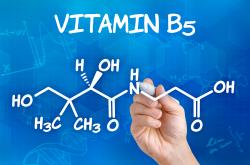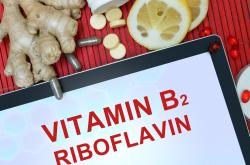Thiamin: How Vitamin B1 Deficiency Can Cause Fatigue
Vitamin B1 - thiamin - deficiency can lead to severe fatigue. Learn the signs and symptoms of low thiamin and how to get adequate daily dosage of this important vitamin.
Thiamin deficiency is a common affliction throughout the developing world – primarily in areas of the world where alcoholism is a major concern, or where white rice is the staple of the diet. In most areas where people have access to a broad variety of food selections, however, it remains a less common phenomenon. Still, it can be a cause of concern for even many people in the Western world, so it is important to be able to rule it out as a potential cause for your fatigue – or address any deficiency if it exists.
What is Vitamin B1 and How Does it Benefit You?
Vitamin B1 is often referred to as thiamin. It is a B-complex vitamin that appears in almost all foods naturally. As a result, you might be wondering how anyone could ever suffer a deficiency of this nutrient. You might be even more shocked to learn that B1 deficiency ranks near the top of nutrient deficiencies for many people in the West.
The reason why this occurs can be summed up in one word: processing. Modern food processing techniques strip thiamin from most food sources, and what that process doesn’t destroy cooking does.
That’s unfortunate, given B1’s prominent role in energy production within the body. Without this vitamin, the metabolism of carbohydrates and fats into the energy the body needs is severely impacted. B1 is the main component involved in transitioning from carb breakdown to the more complex metabolic sequences involved in converting food into energy. Thiamin is not only critical for energy creation, but also plays an important role in the nervous system where it helps to provide energy to the cells of the brain.
Obviously, any disruption in the body’s ability to metabolize food and convert it into the ATP necessary for cellular energy is going to result in less of the fuel the body needs to operate at peak efficiency. And the longer this disruption continues, the greater the fatigue becomes.
How Do You Know if You Suffer From Vitamin B1 Deficiency?
Thiamin is one of those B-complex anti-stress vitamins, so it aids in controlling the impact of the stress response by strengthening the body’s immune system. When a deficiency occurs, however, the symptoms can be very disconcerting. In addition to problems related to the digestion of carbohydrates, patients with insufficient thiamin levels also experience abdominal pain, anxiety, irritation, fatigue, and depression. Psychosis can also occur at extremely low levels of this critical vitamin. Left unattended, the long-term deficiency can result in brain damage.
The main problem with thiamin is that the body can only store so much of it at a time. For people who do not regularly consume foods containing the nutrient, a deficiency can easily develop. Add to that the effects of cooking, and it’s easy to see why so many people need to supplement their B1 levels on a regular basis. If you find yourself suffering from muscle weakness, fatigue, and any level of brain fog or confusion, that could be a sign that you already have a deficiency. Check for these signs:
- Fatigue
- Weakness in the muscles
- Memory issues, depression, or apathy
- Confusion
- Digestive problems or a reduction in appetite
- Unexplained weight loss
How to Diagnose Vitamin B1 Deficiency
Unlike many vitamins which are measured through blood analysis, most doctors test for thiamin deficiency by treating the patients as though he or she is suffering from low levels of the nutrient. If the patient responds favorably to supplementation, then the doctor can proceed to evaluate things like electrolyte levels and rule out any heart complications that might also be contributing to the symptoms.
Food Sources for Vitamin B1
As noted, there are many different food sources for obtaining thiamin. The key is to know how to prepare unprocessed sources so that the nutrients are not damaged. Sources for B1 include vegetables and legumes. So, broccoli, carrots, kale, summer squash, onions, and tomatoes are all good options – and all can be prepared without overcooking. Spinach, eggplant, and cabbage are even better, with asparagus ranking at the top of the list. Sunflowers, flax, lentils, kidney beans and other legumes rank very high as well.
How to Supplement Vitamin B1
Multivitamins for both adults and children contain this important vitamin. It is contained within most B-complex supplements, and can come in softgel form, a lozenge, or tablet. Children’s doses can be found in a chewable form or as liquid. Note that the vitamin is often sold under the name thiamine dydrochloride or thiamine mononitrate. Recommendations for dosage range from .2mg for newborns to 1.2 mg for an adult male.
Potential Side Effects and Interactions
Thiamin is considered safe, though extremely large amounts can create an upset stomach. Since prolonged use of these vitamin supplements can result in deficiencies among other B vitamins, most experts recommend taking the B-complex supplement that includes the entire B group. B1 can interact with heart medications and various diuretics, so always consult with a physician before adding it to your dietary regimen.
Like other vitamins and minerals, thiamin remains an important component of health. It must remain in its proper balance if its role within the body’s systems is to be performed properly. Thankfully, doctors usually have little trouble diagnosing or treating these deficiencies, provided their patients are alert to the signs and symptoms that can signal trouble in this area.
You might also be interested in:
- Thiamin. http://www.merckmanuals.com/professional/nutritional-disorders/vitamin-deficiency-dependency-and-toxicity/thiamin
- Thiamin (vitamin B1). http://www.medicinenet.com/vitamins_and_calcium_supplements/page10.htm#thiamin_vitamin_b1
- How I Found My Long-Lost Energy. http://www.prohealth.com/library/showarticle.cfm?libid=18187
- Thiamine, Fibromyalgia And Chronic Fatigue. http://www.hormonesmatter.com/thiamine-fibromyalgia-chronic-fatigue/
- Vitamin B1/ Thiamine Deficiency. http://draxe.com/thiamine-deficiency/


















Leave a comment